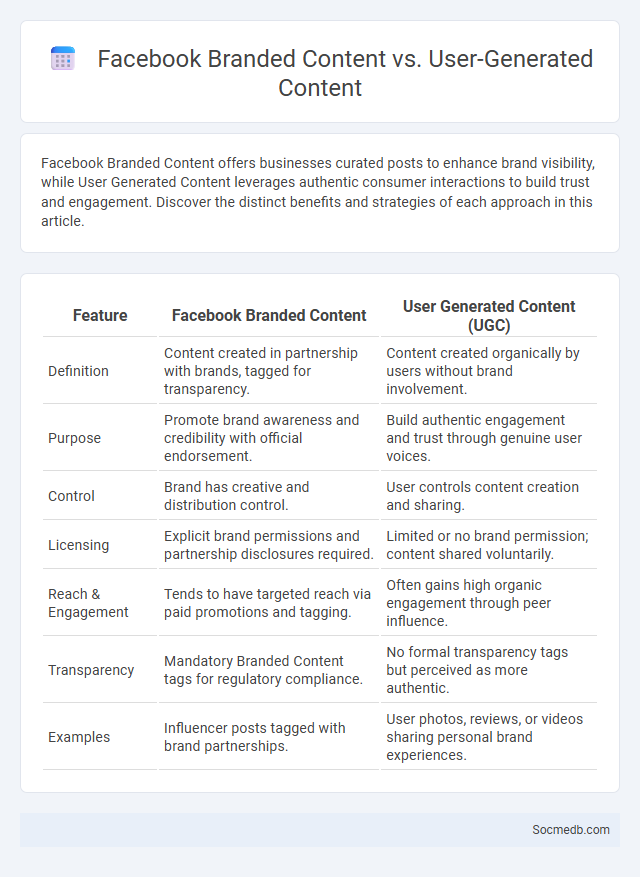
Photo illustration: Facebook Branded Content vs User Generated Content
Facebook Branded Content offers businesses curated posts to enhance brand visibility, while User Generated Content leverages authentic consumer interactions to build trust and engagement. Discover the distinct benefits and strategies of each approach in this article.
Table of Comparison
| Feature | Facebook Branded Content | User Generated Content (UGC) |
|---|---|---|
| Definition | Content created in partnership with brands, tagged for transparency. | Content created organically by users without brand involvement. |
| Purpose | Promote brand awareness and credibility with official endorsement. | Build authentic engagement and trust through genuine user voices. |
| Control | Brand has creative and distribution control. | User controls content creation and sharing. |
| Licensing | Explicit brand permissions and partnership disclosures required. | Limited or no brand permission; content shared voluntarily. |
| Reach & Engagement | Tends to have targeted reach via paid promotions and tagging. | Often gains high organic engagement through peer influence. |
| Transparency | Mandatory Branded Content tags for regulatory compliance. | No formal transparency tags but perceived as more authentic. |
| Examples | Influencer posts tagged with brand partnerships. | User photos, reviews, or videos sharing personal brand experiences. |
Understanding Facebook Branded Content
Facebook Branded Content enables creators and businesses to collaborate by transparently promoting products or services within posts, enhancing audience trust and engagement. Utilizing Facebook's Branded Content tools, users can tag business partners, ensuring clear attribution and access to detailed performance metrics for improved marketing strategies. This feature optimizes content visibility through algorithm prioritization, driving higher reach and fostering authentic brand-consumer relationships on the platform.
What is User Generated Content (UGC)?
User Generated Content (UGC) refers to any type of content, such as photos, videos, reviews, or posts, created and shared by individuals rather than brands on social media platforms. UGC enhances authenticity and trust in your marketing efforts by showcasing real experiences and opinions from customers. Leveraging UGC can significantly boost engagement, brand awareness, and influence purchasing decisions.
Defining Traditional Branded Content
Traditional branded content refers to marketing materials directly produced and distributed by a brand to promote its products or services through owned media channels, such as company websites, brochures, and television commercials. This content typically emphasizes the brand's identity, messaging, and product features, aiming to build brand awareness and loyalty. Unlike influencer marketing or user-generated content, traditional branded content is fully controlled by the brand and designed to deliver a consistent, carefully crafted message to its target audience.
Key Differences: Facebook Branded Content vs Branded Content
Facebook Branded Content specifically refers to posts where creators tag a business partner, ensuring transparency and enabling businesses to access detailed performance metrics. In contrast, Branded Content encompasses a broader category of sponsored content across various platforms, not limited to Facebook's tagging and analytics features. Understanding these differences helps you optimize your marketing strategy by leveraging Facebook's unique tools for authentic engagement and measurable results.
Facebook Branded Content vs User Generated Content
Facebook Branded Content offers businesses a controlled platform to promote products through sponsored posts by influencers or official pages, ensuring brand consistency and targeted reach. User Generated Content (UGC) on Facebook harnesses authentic consumer experiences and organic posts, boosting engagement and trust through peer recommendations without direct brand intervention. Combining Facebook Branded Content with UGC can amplify marketing efforts by balancing polished messaging and genuine audience interaction.
Brand Control and Authenticity in Content Creation
Maintaining brand control on social media ensures Your messaging remains consistent and aligned with core values, fostering trust among your audience. Authenticity in content creation drives genuine engagement, as users increasingly seek relatable and transparent brand interactions. Leveraging data analytics and user feedback helps tailor content that truly reflects Your brand identity while resonating with target demographics.
Engagement Metrics: Which Content Performs Better?
Engagement metrics such as likes, shares, comments, and time spent on content reveal that visual posts like videos and infographics consistently outperform text-only updates in capturing your audience's attention. User-generated content and interactive elements such as polls and quizzes significantly boost engagement by fostering active participation. Monitoring these metrics allows you to tailor your social media strategy to prioritize high-performing content that drives deeper connections and enhances your brand visibility.
Legal and Disclosure Requirements
Social media platforms require strict adherence to legal and disclosure requirements to ensure transparency and consumer protection. You must comply with regulations such as the Federal Trade Commission (FTC) guidelines, which mandate clear disclosure of sponsored content and influencer partnerships. Failure to disclose paid endorsements or accurately represent information can lead to penalties and damage your brand's credibility.
Best Practices for Brands on Facebook
Brands on Facebook achieve maximum engagement by consistently posting high-quality, relevant content tailored to their target audience. Utilizing Facebook's advanced targeting tools and analyzing insights helps optimize ad campaigns and organic reach. Engaging with followers through timely responses and interactive posts fosters community loyalty and boosts brand visibility.
Choosing the Right Content Strategy for Your Brand
Choosing the right content strategy for your brand on social media involves analyzing audience behavior, platform algorithms, and competitive trends to maximize engagement and growth. Tailoring content formats such as videos, stories, or posts based on data-driven insights ensures relevance and drives higher interaction rates. Your brand's unique voice and message should be consistently aligned with the chosen strategy to build trust and foster a loyal community.
 socmedb.com
socmedb.com